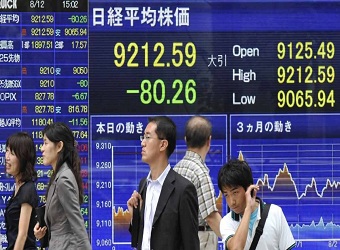Asian equities traded mostly higher on Monday, following the continued recovery on Wall Street last week and as investors digest yet another missile test out of North Korea at the weekend.
The hermit state said the missile test on Sunday involved an intermediate-range ballistic missile, according to Reuters. North Korean state media said leader Kim Jong Un had “approved the deployment” of the missile, Reuters said.
Markets are also likely watching the outcome of U.S. President Donald Trump’s first foreign trip which began in Saudi Arabia during the weekend. An arms deal worth $350 billion was inked on Saturday between the two countries.
The Nikkei 225 was 0.45 percent higher. Australia’s ASX 200 added 0.83 percent, driven largely by its energy and materials sub-indexes which were up 2.17 percent and 1.95 percent respectively. South Korea’s benchmark Kospi index shrugged off news of the North Korean missile test, gaining 0.49 percent.
South Korea’s benchmark Kospi index shrugged off news of the North Korean missile test, gaining 0.49 percent.
The Hang Seng Index jumped 0.94 percent, but markets on the mainland were in the red. The Shanghai Composite was down 0.24 percent and the Shenzhen Composite declined 0.515 percent.
In Japan, Toshiba’s U.S. nuclear arm Westinghouse Electric indicated that it would lockout 172 union members as contract negotiations had reached an impasse. Toshiba shares shed 1.85 percent.
Shares of automotive parts manufacturer Takata jumped 16.84 percent. Shares of the company had jumped more than 20 percent in the last session on news of that some automakers had agreed to a settlement over the use of defective Takata airbags.
Cathay Pacific will cut 600 jobs in its bid to turn around losses. The airline had posted its first annual loss in close to a decade in March this year.
In a statement, Cathay said those affected represent 25 percent of management and 18 percent of non-managerial staff. Cabin crew and pilots were not affected by the job cuts. Shares of the company were jumped 1.77 percent on the news.
The dollar rose slightly against a basket of rival currencies, last trading at 97.259, but off levels around the 98 handle seen early last week. Against the yen, the greenback gained slightly to fetch 111.52. Dollar/yen traded at the 113 level early last week.
While U.S. equity markets appeared to have turned their focus to strength in corporate earnings and the economy, political news continued to weigh on the dollar last Friday, said National Australia Bank Currency Strategist Rodrigo Catril.
Oil prices extended gains on the back of output cut extension hopes. U.S. West Texas International surged 0.93 percent to trade at $50.80 a barrel while Brent crude gained 0.86 percent to trade at $54.07.
“It’s a big week for oil with the OPEC meeting in Vienna taking place on Thursday and the market having already digested news that both Russia and the Saudi’s have advocated a nine-month extension … (T)he key question here this week is with price rallying into the meeting, will the outcome live up to expectations or will traders sell the fact?” IG Chief Market Strategist Chris Weston wrote in a Monday note.
In economic news, Japan trade data for the month of April reflected that exports rose for the 7.5 percent on year, below analyst expectations of 7.8 percent. Imports, however, rose 15.1 percent, above the forecast of 14.8 percent.
On Wall Street, equities closed higher for a second straight session last Friday after the biggest sell-off in the year earlier last week, with the Dow Jones industrial average closing 0.69 percent higher at 20,804.84.
Source: CNBC
